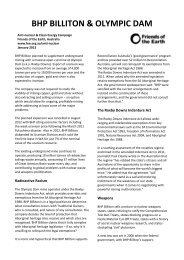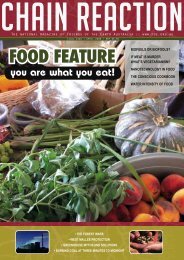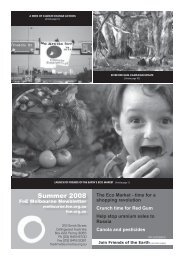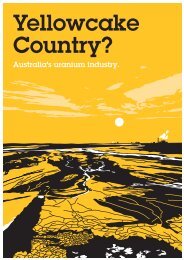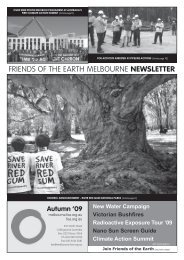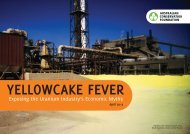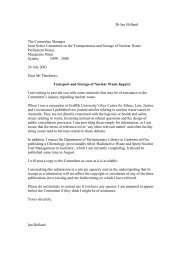Thirty Years of Creative Resistance - Friends of the Earth Australia
Thirty Years of Creative Resistance - Friends of the Earth Australia
Thirty Years of Creative Resistance - Friends of the Earth Australia
Create successful ePaper yourself
Turn your PDF publications into a flip-book with our unique Google optimized e-Paper software.
forum where differing opinions could be<br />
aired. In a series <strong>of</strong> letters and essays,<br />
many women expressed opinions like that<br />
<strong>of</strong> Margie Kaye, who said “<strong>the</strong> environment<br />
movement over <strong>the</strong> last 10 years has<br />
continually failed to examine sexism within<br />
its internal structures”.<br />
A number <strong>of</strong> women declared that <strong>the</strong><br />
lack <strong>of</strong> action meant <strong>the</strong>y would no longer<br />
work in <strong>the</strong> green movement. This debate<br />
helped fuel internal tensions. In 1982,<br />
Denise Chevalier wrote on behalf <strong>of</strong><br />
FoE Collingwood “we … are not happy<br />
about several aspects <strong>of</strong> <strong>the</strong> latest Chain<br />
Reaction”, highlighting <strong>the</strong> fact that “many<br />
women … feel insulted” by an article by<br />
Kimberley O’Sullivan that said that sexist<br />
behaviour was rife in FoE and <strong>the</strong> broader<br />
movement. “We, <strong>the</strong> women at FoE, have<br />
fought hard for what we have achieved.<br />
We have far more women than men<br />
working with us. The women are now at<br />
<strong>the</strong> fore in <strong>the</strong> decision making in all our<br />
campaigns”.<br />
FoE’s strong and growing emphasis on<br />
social justice was not appreciated by<br />
everyone, “I am dismayed at <strong>the</strong> shift in<br />
CR from environmental towards social/<br />
political issues such as feminism and<br />
homosexuality” wrote one reader in 1983.<br />
However, in general <strong>the</strong>re was a clear<br />
...................................................................................................................................................................................................<br />
LEAD FREE PETROL<br />
The campaign to stop <strong>the</strong> addition <strong>of</strong><br />
lead to <strong>Australia</strong>n petrol was a major<br />
success for <strong>Friends</strong> <strong>of</strong> <strong>the</strong> <strong>Earth</strong><br />
and its style <strong>of</strong> campaigning. In <strong>the</strong><br />
space <strong>of</strong> two years, a community<br />
campaign, spearheaded by FoE<br />
and funded by local government,<br />
managed to completely reverse <strong>the</strong><br />
situation relating to <strong>the</strong> sale <strong>of</strong> petrol<br />
in <strong>Australia</strong>. Despite extravagant<br />
lobbying by <strong>the</strong> oil and lead industries,<br />
environmentalists managed to stir<br />
public concern and persuade <strong>the</strong><br />
federal and state governments<br />
to adopt a program involving <strong>the</strong><br />
reduction <strong>of</strong> lead levels and <strong>the</strong><br />
introduction <strong>of</strong> lead free petrol by mid<br />
1985.<br />
<strong>Friends</strong> <strong>of</strong> <strong>the</strong> <strong>Earth</strong> played a major<br />
role in co-ordinating <strong>the</strong> campaign<br />
nationally and producing educational<br />
materials for distribution. Stickers,<br />
booklets and multilingual leaflets<br />
were produced and widely distributed<br />
to child care organisations, local<br />
councils, governments bodies and <strong>the</strong><br />
general public. A regular newsletter<br />
played an important role in keeping<br />
interested people informed <strong>of</strong> <strong>the</strong><br />
latest developments in what turned out<br />
to be a very complex debate. FoE’s<br />
ability to mobilise people, to organise<br />
meetings, demonstrations and street<br />
stalls was very important in mounting<br />
a continuing campaign. The skills that<br />
had been picked up by campaigners<br />
on previous issues were vital to <strong>the</strong><br />
success <strong>of</strong> <strong>the</strong> efforts to convey <strong>the</strong><br />
anti lead message in <strong>the</strong> mass media.<br />
This victory and <strong>the</strong> alliances built in<br />
reaching it, lead on to o<strong>the</strong>r campaign<br />
work, including lead in baby food,<br />
industrial pollution, indoor air pollution,<br />
occupational exposure to lead and <strong>the</strong><br />
need for quick action on <strong>the</strong> reduction<br />
<strong>of</strong> lead levels.<br />
From an article by Andrew Herrington,<br />
Chain Reaction.<br />
FoE 30 <strong>Years</strong> 36



